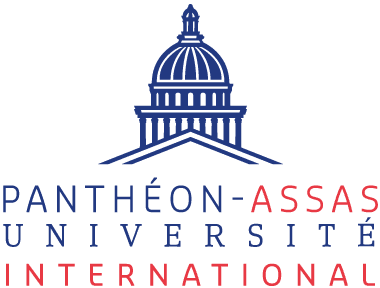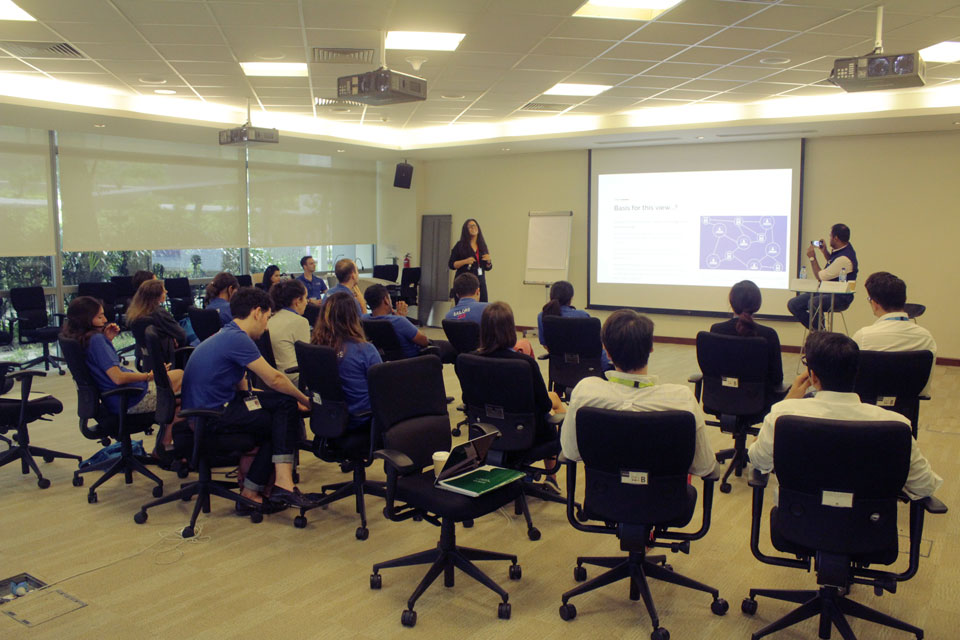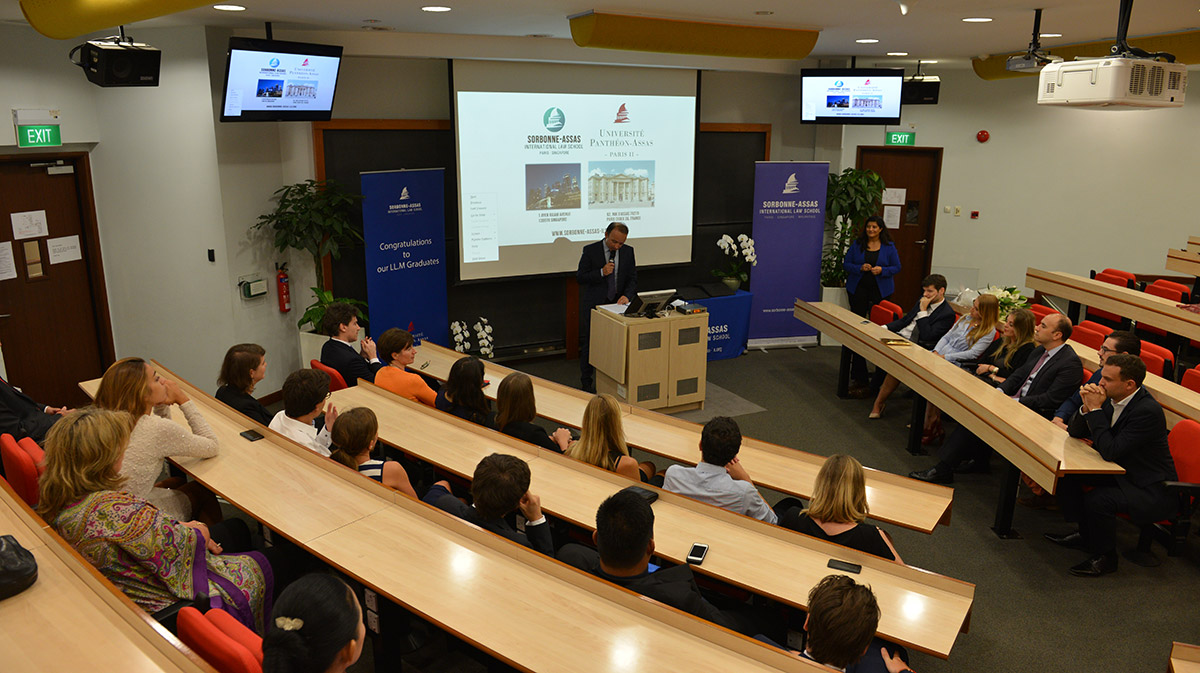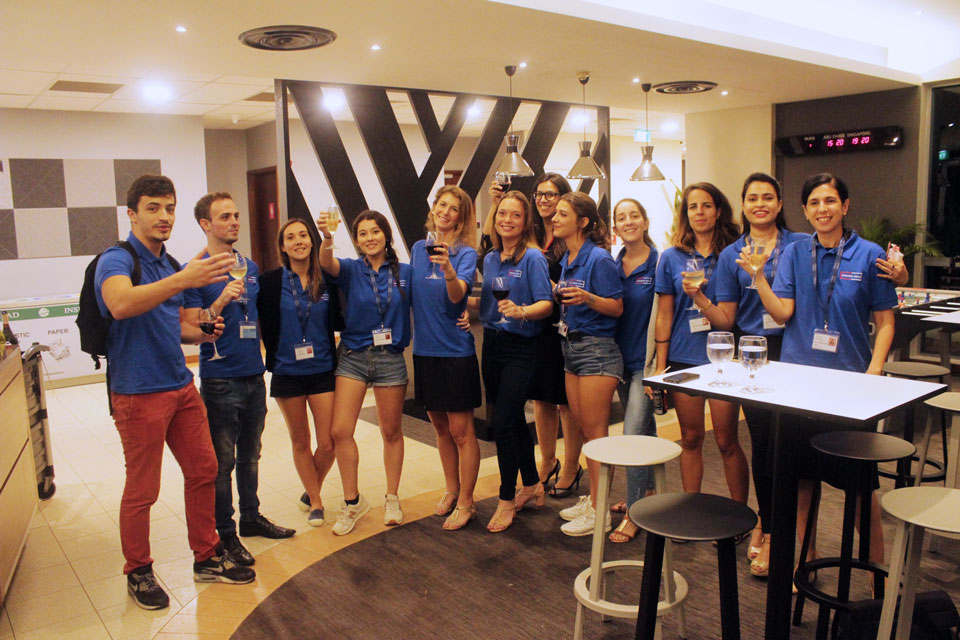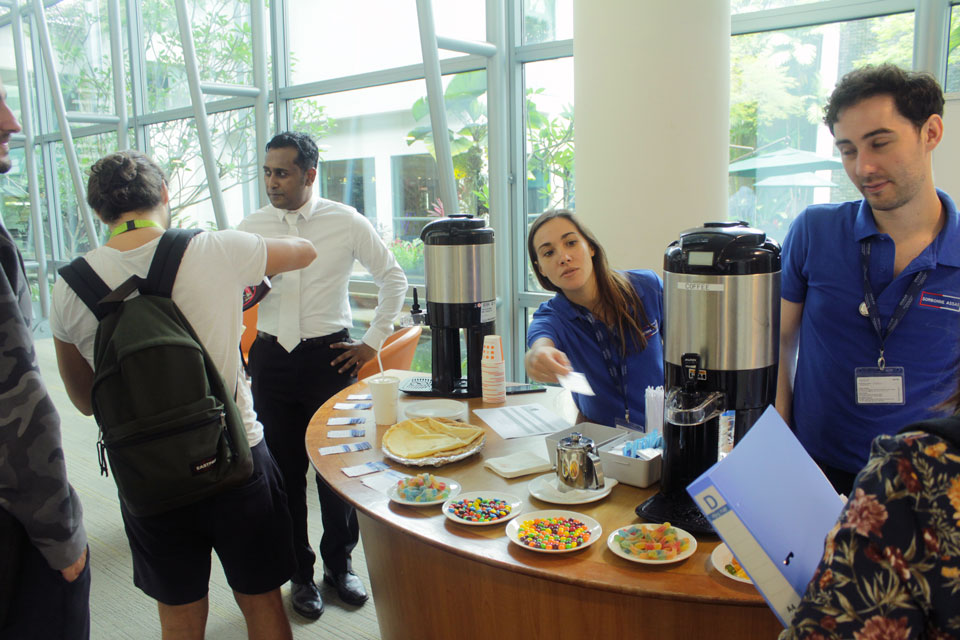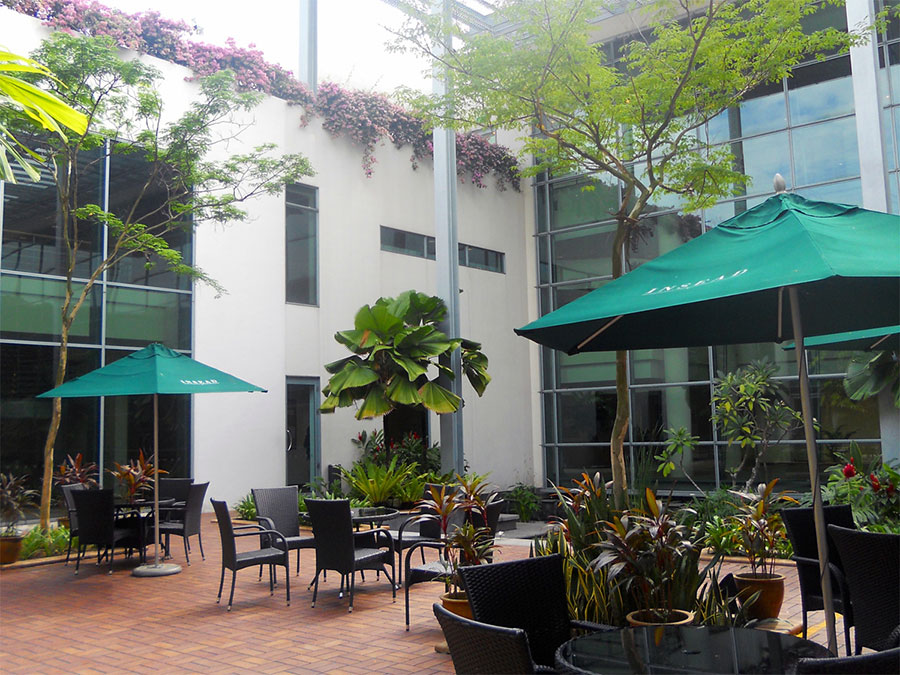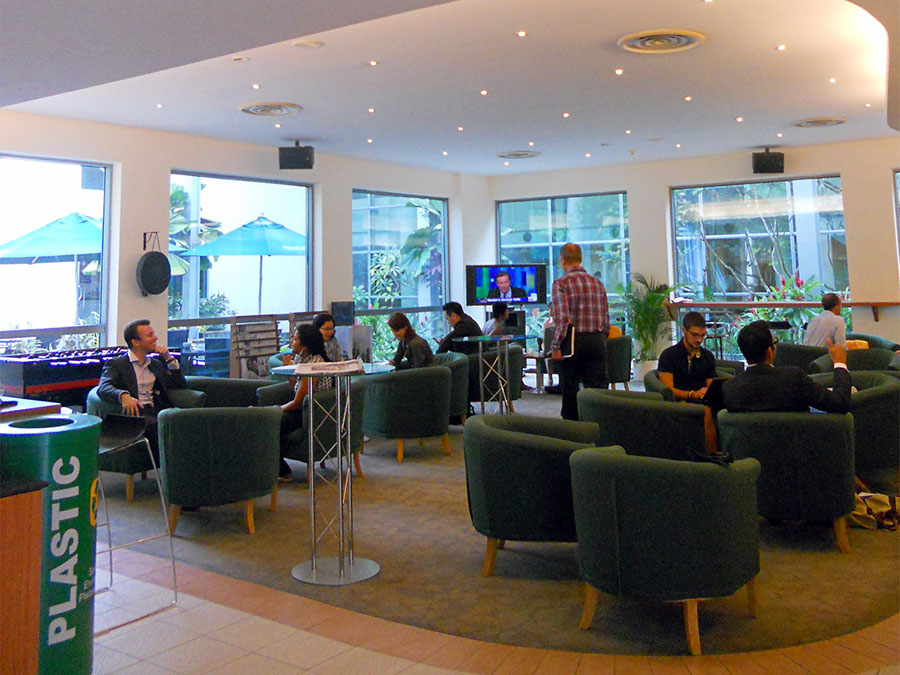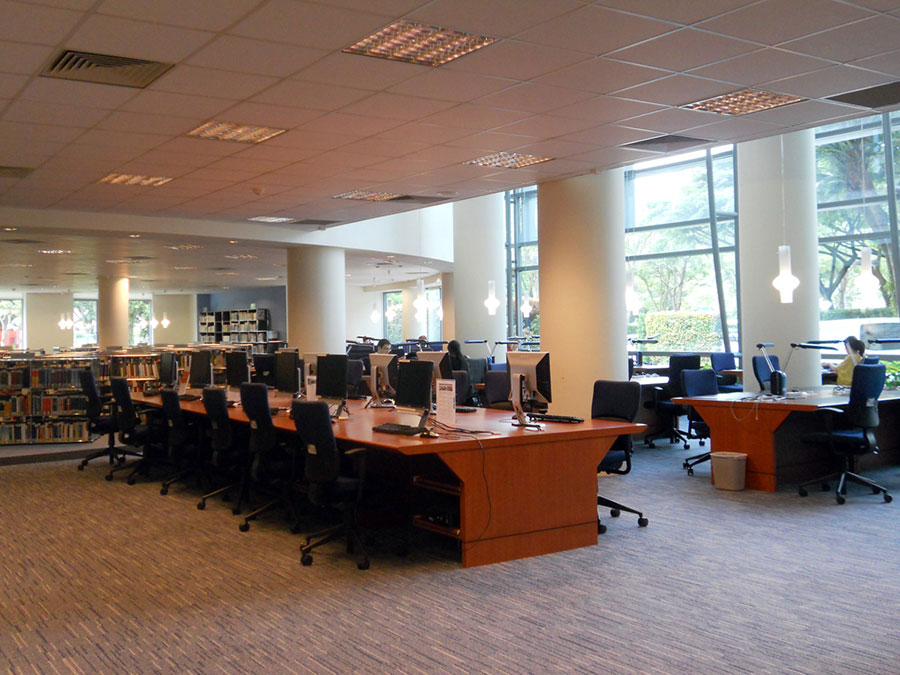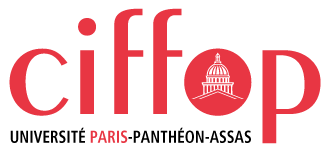
(MC) Certificate in Talent Management
— Singapore —
The Certificate in Talent Management:
get to the next level in your career
Attracting, retaining and engaging the right talent is a key issue for employers, especially in Asia.
A critical skills gap, a limited talent pool, a shift in expectations, a digital disruption, and the post-Covid reconfiguration of the work environment have created a hyper-competitive hiring market. To tackle this challenge, employers need a good understanding of the context as well as highly trained HR staff with a real business dimension, a deep understanding of regional HR issues and practical knowledge of talent management techniques.

Drawing on the successful experiences of major French and European multinationals in attracting and retaining top talent in the ASEAN countries, this programme will help young HR executives develop operational skills to tackle these issues by:
- Reinforcing their knowledge of current HR management issues
- Upgrading their skills in talent management processes: identification, attraction, retention, development and engagement
- Providing them with an overview of the main strategic drivers of digital disruption in the HR field and business management in both the globalized and local contexts
- Providing them with a set of skills and a toolbox of HR practices in order to help them step up from an administrative and/or local position to a regional business partner mindset
The programme is developed and delivered by one of the world’s leading Human Resources Management schools, the CIFFOP, which is part of the prestigious Université Paris Panthéon-Assas.
Modules
The programme (118.5 hrs) is divided into 5 modules and proposes several additional conferences and options.
Minimum Entry Requirements:
Age: 22 years old
Language: The English proficiency required is either TOEIC 800, or IELTS 7.5, or TOEFL 95. Proof of English proficiency is not a prerequisite for professionals in Singapore.
Academic: Bachelor’s degree level
Fees (full programme):
SGD 16,000*
*You have the option to either enroll in the full programme or select specific modules of interest.
Module 1: HR as a business partner – 4 days
The objective of this first module is to develop the business partner mindset that HR managers must have to face the war for talent and to reconcile the company’s performance issues with social issues.
Talent management forces HR managers to level up their skills in order to better market their company to candidates.
This module will address the following issues:
- acquiring a true managerial and business partner dimension;
- positioning HR in the value creation process;
- developing a value proposition as an HR;
- influencing and convincing company executives of the importance of addressing current HR issues.
Themes
- Talent Management Issues – introduction to the programme
- From HR to HRBP: (1 day)
- The Strategic Dimension of Talent Management
- From Administration to Management
- Talent Hyper-Competitiveness (1 day)
- The Leadership Dimension of the HRBP (1 day)
- HR Talent issues in Specific Contexts: (1 day)
- HR Issues in Hypergrowth Start-ups
- Talent Management in the Public Sector
Skills portfolio (knowledge, know-how, soft skills):
- Understanding the link between strategy and HR
- Developing business acumen
- Proactivity
- Managing complexity
- Business management
- Decision-making
- Strategic planning
- Strategic thinking
- Influence capability
Module 2 : Talent Attraction and Acquisition – 2 days
The objective of the module is to develop a strategy for targeting and attracting talent based on three essentials: an attractive image, appropriate sourcing techniques and the ability to communicate and negotiate with talents.
This module will address the following issues:
- communicating about your business in an attractive way;
- developing a sincere and differentiating employer image;
- targeting the right person for the right need;
- communicating effectively.
Themes
- Internal / External Sourcing (1 day):
- Building a Sourcing and Talent Acquisition Strategy
- Sourcing Strategy and Tools
- Innovative Recruitment Tools
- Communicating Effectively (1 day):
- Marketing and Communication Techniques applied to HR
- Pitching and Negotiating
Skills portfolio:
- Know how to build a talent acquisition strategy
- Know how to pitch your company
- Develop storytelling abilities
- Develop negotiation skills
Module 3: Managing Talents – 3.5 days
HR are faced with rapid turn-over of talents in Singapore and the APAC region, making the development of a proper retention strategy crucial. The objective of this module is to understand the key levers to develop talents, retain them and engage them. Retaining and engaging take place over different time frames, from the short term to the long term: onboarding, motivating, offering an attractive C&B plan, improving the performance review process, coaching and developing raw talents, dealing with career plan design, preparing the CEOs of the future, creating a culture of innovation and sustainability.
This module will address the following issues:
- developing a successful onboarding experience;
- strategies for retaining talents; developing talents;
- keeping talents motivated and engaged.
Themes
- Talent Development: (2 days)
- Onboarding Experience
- Retention Strategies
- Development Models (Training, Feedback…)
- Career Perspectives and Mobility (Talents Reviews, Succession Planning, Career Path…)
- The Role of Corporate Universities
- The role of Emotions in Interpersonal Communication
- Performance Management & Measurement in the Private & Public sectors (0.5 day)
- Compensation & Benefits for Talents (1 day)
Skills portfolio:
- Understand the dynamics of motivation and engagement
- Know how to build an attractive C&B plan
- Dealing with complexity
- Coaching and advising
- Emotional intelligence
- Employee experience expertise
Module 4: Human Development Management – 2.5 days
Talent management is about dealing with individuals who both contribute their skills and expertise to collective performance and seek fulfillment within the organization. This is where companies need to have a strategy for developing people and enabling them to perform at their best. The objective of this module is to help HR managers identify existing talent pools, by developing their ability to see and value differences and that which is not visible, drawing on diversity as a performance lever in a hyper-competitive environment.
This module will address the following issues:
- integrating Human Development and Talent Management;
- identifying and developing talents;
- tackling current issues such as the female agenda or an aging workforce.
Themes
- Human Development as a Distinctive Performance lever (1 day)
- Diversity and Inclusion (1.5 days):
- Identifying Talent Pools
- The female agenda
- Going beyond visible differences and managing invisible differences
- Using the potential of the wisdom of age and experience
Skills portfolio:
- Cultural awareness and sensitivity
- Differences awareness and sensitivity
- Emotional intelligence
- Business ethics
Module 5: Future of Work – 4 days
Talent management is about dealing with individuals who both contribute their skills and expertise to collective performance and seek fulfillment within the organization. This is where companies need to have a strategy for developing people and enabling them to perform at their best. The objective of this module is to help HR managers identify existing talent pools, by developing their ability to see and value differences and that which is not visible, drawing on diversity as a performance lever in a hyper-competitive environment.
This module will address the following issues:
- integrating Human Development and Talent Management;
- identifying and developing talents;
- tackling current issues such as the female agenda or an aging workforce.
Themes
- HR Data, People Analytics & Digitalization (2 days)
- Using data in HR
- HR IS solutions: advising the proper tool
- AI in HR
- HR Innovation Models (2 days)
- F-form organization models
- Design thinking & creativity methods
- Create the future
Skills portfolio:
- Employee experience expertise
- Becoming more analytical and data-driven
- Critical thinking
- Creativity / thinking outside of the box
- Troubleshooting
- Implementing change
In-between the modules:
Co-Development Project Group Presentation (15h)
The participants will be followed collectively in groups of 5, by a certified executive coach who will teach them the co-development method. This method will then be followed by the group throughout the year with the objective of collective learning and collective problem solving.
HR in Asia (7,5h)
During this module, 5 different HR professionals operating in different ASEAN-zone countries will address the current issues they face: What are the HR stakes in the country? What does it mean to be an HR in this country? What are the HR constraints, risks and opportunities in the country? The following countries will be represented: Singapore, Malaysia, India, Indonesia, Philippines.
Job Swapping
Job swapping is an opportunity to discover other work environments and other talent management practices from within a partner company in a totally immersive way, for a week, a month or more. Job swapping provides a form of mobility for HR while staying in Singapore.
This system is optional and based on the willingness of the attendee and her/his employer. It has already been successfully implemented in France and Europe.
Schedule
January 2024:
Module 1 – 1st part (2 days)
- Thursday, January 25th
- Friday, January 26th
February 2024:
Module 1 – 2nd part (2 days)
- Thursday, February 22nd
- Friday, February 23rd
March 2024:
Module 2 – (2 days)
- Thursday, March 21st
- Friday, March 22nd
April 2024:
Module 3 – 1st part (2 days)
- Thursday, April 25th
- Friday, April 26th
May 2024:
Module 3 – 2nd part (1.5 days)
- Thursday, May 30th
- Friday, May 31st
July 2024:
Module 4 – (2.5 days)
- Wednesday, July 3rd (0.5 day)
- Thursday, July 4th
- Friday, July 5th
August 2024:
Module 5 – 1st part (2 days)
- Thursday, August 29th
- Friday, August 30th
September 2024:
Module 5 – 2nd part (2 days)
- Wednesday, September 25th
- Thursday, September 26th
Friday, September 27th 2024:
- Final Coursework defense
Notes
The co-development module (15h – online), delivered by Dr Pedro Gonzalo, Assistant Professor, Toulouse School of Management University, France. It will not be graded.
The conferences “HR in Asia” (7,5h – online) will be added to this schedule. The speakers will be HRD from different countries. They will not be graded.
Evaluation
For all students: 75% compulsory attendance. If attendance is less than 75% and is not duly justified, the certificate or module is not validated.
For students taking only one module: Each module will be assessed by a multiple-choice questionnaire administered in class at the end of each module. The module is validated if the student has a mark = or > 50% correct answers.
For students taking the whole certificate:
- The MCQs for each module will count for 20% of the final grade.
- A final coursework will count for 80% of grade final. Students will be asked to produce a portfolio, which will be presented to a jury at the end of the certificate. The certificate is validated if the student has a total mark = or > 50% (10/20).
Academic Directors

Quentin LEFEBVRE
Associate Professor

Claire PICQUE-KIRALY
Associate Professor
